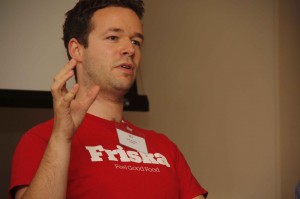Creating the right culture, communicating effectively with staff and having fun are among the key elements for a successful entrepreneurial business.
These points were highlighted by three entrepreneurs – each at different stages in their business growth – at an event last night.
The speakers included former University of Bath student Griff Holland, co-founder of whole food outlet Friska, Mark Mason, serial entrepreneur and chief executive of Mubaloo, the UK’s largest developer of mobile phone applications, and Miles Bullough, broadcast and executive at Aardman Animations – looked at issues such as How do you innovate to take your business from micro to global?, Is there any such thing as a new idea? and How do you keep business creativity fresh in order to stay one step ahead of the competition?
Griff Holland explained how he had the idea for Friska in 2003 after a family holiday in the US where he had eaten healthy fast food. But it wasn’t until he met a fellow former University of Bath gradate Ed Brown that the business took shape. Friska opened its first cafe in Victorial Street, Bristol, two years ago and recently launched its second, at the Bristol and Bath Science Park. It is now working torwards a third, to open next year, and has ambitious plans to develop a chain of cafes.
He told the meeting, staged jointly by the Chartered Institute of Marketing (CIM) and the Institute of Directors (IoD) and supported by Bath Business News’ sister website Bristol Business News, that Friska was a feelgood brand so creating the right culture was vital.
Mark Mason, former owner of Bristol specialist marketing agency Mason Zimbler who launched app developer Mubaloo two years ago. He spoke about the lessons he had learnt through launching five businesses over 25 years and passed on his 18 tips, among them “Judge staff by results, not hours”, “Have fun – it’s what it’s all about”, “Your reputation is everything” and “Avoid mad people”.
Miles Bullough, head of broadcast at Bristol animators Aardman, explained how difficult it is to maintain creativity in a business now employing 600 people.
He stressed that while a large company has to have a bureaucracy such as finance, facilities and HR departments, it is vital they do not to stifle creativity. Constantly bringing in new talent is important and communicating effectively with staff.
Gently disagreeing with Mark, he said sometimes it was good to employ ‘mad’ people as they brought fresh ways of thinking to the organisation – so long as you subject them to the disciplines of the business later.
The event, staged at UWE, finished with a lively question-and-answer session.




















